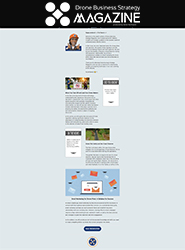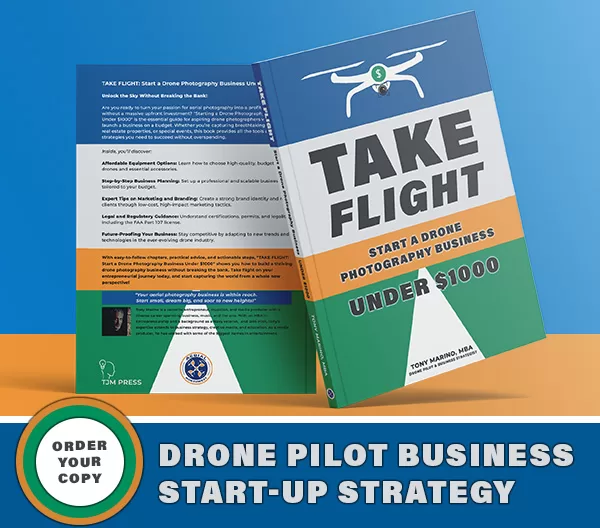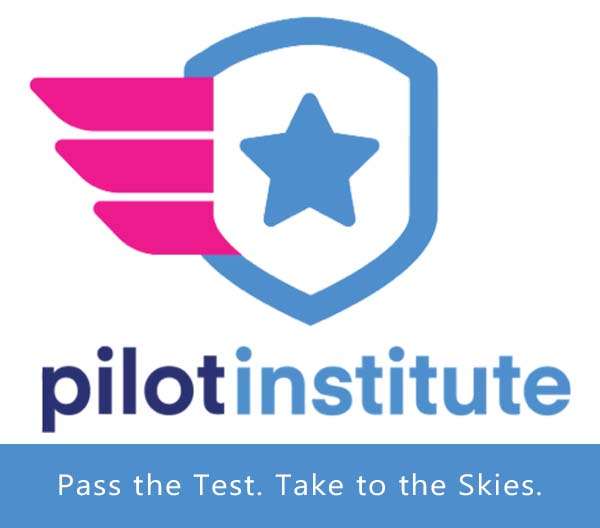
Creating a unique brand identity is crucial for every Part 107 drone pilot who provides commercial drone services to businesses and consumers because it helps them establish a clear identity and differentiate themselves from their competitors. By knowing precisely who they are and who they’re not, drone pilots can effectively communicate their unique value proposition, build trust with their customers, and create a loyal customer base.
A strong brand identity also helps drone pilots to create a memorable and recognizable image, which is essential in a competitive market. Knowing their brand identity also enables drone pilots to make informed decisions about their marketing strategy and the services they offer, ensuring they stay true to their brand and deliver high-quality services that align with their values and mission. Overall, creating a unique brand identity is essential for every Part 107 drone pilot to succeed and grow their business.
What Is Business Branding?
Business branding refers to the process of creating a unique name, design, symbol, and/or other features that differentiate a business or product from its competitors in the marketplace. The ultimate goal of branding is to create a lasting impression in the minds of customers and potential customers, to build trust and loyalty, and to help the business stand out in a crowded market.
Effective branding involves not just creating a logo or a tagline, but also developing a consistent brand identity that is reflected in all aspects of the business, from the products or services offered, to the way the business is marketed, to the customer experience. It also involves understanding the target audience and creating a brand that resonates with their values and needs.
Successful branding can help a business establish a strong reputation, increase brand awareness, and ultimately drive sales and revenue.
To accurately identify their unique brand, a drone pilot should take the following steps:
- Define Your Mission: The drone pilot should determine their mission, including the purpose of their services, what they hope to achieve, and how they plan to make a difference in their industry.
- Identify Your Target Market: The drone pilot should determine their target market, including the demographics, interests, and needs of their potential customers.
- Conduct Market Research: The drone pilot should conduct market research to determine what services are in demand and what their competitors are offering. They should also identify the gaps in the market that they can fill.
- Develop Your Value Proposition: The drone pilot should develop a clear value proposition that differentiates their services from their competitors. This should communicate the unique benefits of their services and how they solve their customers’ problems.
- Create Your Brand Personality: The drone pilot should create a brand personality that resonates with their target market. This includes their brand voice, tone, and visual identity.
- Craft Your Brand Message: The drone pilot should craft a brand message that effectively communicates their mission, value proposition, and brand personality. This message should be consistent across all marketing channels.
- Test and Refine: The drone pilot should test their brand message and visual identity with their target market to ensure it resonates with their audience. They should refine their brand as necessary based on feedback from their customers.
By following these steps, the drone pilot can accurately identify their unique brand and create a successful brand awareness campaign in their market sector.
Define the Mission of Your Drone Services Business
Defining a mission statement is important for a drone pilot who provides drone services to articulate their purpose, values, and goals. Here are some best ways to define a mission for a drone pilot’s business:
- Identify the core purpose: Start by identifying the fundamental reason for providing drone services. What inspired you to become a drone pilot, and what problems are you solving for your clients?
- Define your values: Consider the values that guide your business’s decision-making, culture, and behavior. What principles are most important to you, and how do they shape your approach to delivering drone services?
- Set your goals: Determine what you want to achieve in the short and long term. What are your specific, measurable, and achievable goals for your drone business?
- Understand your target market: Understand the needs and wants of your target market, and how your drone services can solve their problems.
- Make it concise: Keep your mission statement clear, concise, and memorable. It should be easy to understand and communicate to others.
By following these steps, a drone pilot can create a mission statement that reflects their purpose, values, and goals, and effectively communicates their identity to potential clients.
Identifying Your Target Market (Audience)
Identifying the target market is crucial for a drone pilot who provides drone services. Here are some best ways to identify the target market for a drone pilot’s business:
- Determine the drone service niche: Identify the specific area or niche in which you want to provide drone services. For instance, you may focus on real estate, construction, agriculture, surveying, or aerial photography and videography.
- Research the industry: Research the industry or niche in which you want to offer drone services. Understand the needs, challenges, and opportunities in that industry.
- Analyze competitors: Identify who your competitors are and what they are offering. Analyze their strengths, weaknesses, and pricing strategy.
- Understand customer needs: Understand the needs and wants of potential customers in your target market. What problems are they facing, and how can your drone services solve them?
- Determine ideal customer profile: Determine the ideal customer profile by defining the demographic, psychographic, and geographic characteristics of your target market. Who are they, where are they located, and what do they value?
By following these steps, a drone pilot can identify their target market and develop a focused marketing strategy that effectively reaches and converts potential customers.
Conduct Market Research
Conducting market research is crucial for a drone pilot who provides drone services to identify their target market, understand customer needs, and develop an effective marketing strategy. Here are some of the best ways for a drone pilot to conduct market research:
- Online research: Conduct online research by using search engines, social media, and industry-specific websites and forums to gather information about your target market and competitors.
- Customer surveys: Create and conduct customer surveys to understand customer needs, preferences, and pain points. This information can help you refine your drone services to better meet customer needs.
- Competitor analysis: Analyze your competitors’ offerings, pricing strategy, and marketing approach to identify opportunities and areas of differentiation for your drone services.
- Focus groups: Conduct focus groups with potential customers to gain deeper insights into their needs and wants. This can help you refine your marketing messages and service offerings.
- Industry events: Attend industry events and trade shows to network with potential customers and gain insights into industry trends and opportunities.
By conducting market research, a drone pilot can gain valuable insights into their target market and develop a marketing strategy that effectively reaches and converts potential customers.
Develop Your Value Proposition
A value proposition is a clear statement that explains what benefits a customer can expect from a product or service. It’s important for a drone pilot who provides drone services to have a clear value proposition to differentiate themselves from their competitors. Here are some of the best ways for a drone pilot to develop a value proposition:
- Understand customer needs: Conduct market research to understand what customers need from drone services. This can help you identify what features and benefits to emphasize in your value proposition.
- Identify unique selling points: Identify the unique selling points of your drone services, such as specialized equipment, experience in a specific industry, or a focus on safety and quality.
- Focus on benefits, not features: Instead of listing features, focus on the benefits your drone services provide. For example, instead of saying “we have high-quality cameras,” say “we provide clear and detailed aerial footage that can be used for marketing and analysis.”
- Keep it clear and concise: A value proposition should be clear and concise, focusing on the most important benefits of your drone services.
- Test and refine: Once you have developed a value proposition, test it with customers to see if it resonates. Use feedback to refine and improve your value proposition over time.
By developing a strong value proposition, a drone pilot can effectively communicate the benefits of their drone services to potential customers and stand out in a crowded market.
Create Your Brand Personality
Creating a brand personality is an important part of building a unique and memorable brand. Here are some of the best ways for a drone pilot who provides drone services to create a brand personality:
- Define your brand values: Identify the values that are most important to your brand and use them to guide your brand personality. For example, if safety is a key value for your brand, you may want to create a brand personality that is professional, dependable, and trustworthy.
- Understand your audience: Consider the preferences and interests of your target audience when developing your brand personality. For example, if your target audience is younger and more tech-savvy, you may want to create a brand personality that is more modern and innovative.
- Develop a unique voice: Create a consistent and unique voice for your brand that reflects your brand values and personality. This could be a playful, conversational tone or a more professional and authoritative tone, depending on your brand personality.
- Use visual elements: Use visual elements such as colors, typography, and imagery to reinforce your brand personality. For example, if your brand personality is energetic and adventurous, you may want to use bold, bright colors and dynamic imagery.
- Be consistent: Consistency is key when creating a brand personality. Ensure that all elements of your brand, including your website, social media, and marketing materials, are aligned with your brand personality.
By creating a strong brand personality, a drone pilot who provides drone services can differentiate themselves from competitors, attract the right target audience, and build a strong and memorable brand.
Crafting Your Brand Message
Crafting a clear and effective brand message is crucial for a drone pilot who provides drone services to communicate their unique value proposition and differentiate themselves from competitors. Here are some of the best ways for a drone pilot to craft a brand message:
- Define your unique value proposition: Identify what sets your drone services apart from competitors and create a concise and clear message that communicates your unique value to potential customers.
- Understand your target audience: Consider the needs, preferences, and pain points of your target audience when crafting your brand message. Use language and messaging that resonates with your audience and addresses their specific challenges.
- Use simple language: Use language that is easy to understand and avoids industry jargon or technical terms that may confuse or intimidate potential customers.
- Focus on benefits: Instead of just listing features, focus on the benefits that your drone services can provide to customers. How can your services improve their operations, save time and money, or enhance their business?
- Be consistent: Ensure that your brand message is consistent across all marketing materials, including your website, social media, and promotional materials.
By crafting a strong brand message, a drone pilot who provides drone services can effectively communicate their unique value proposition and attract the right target audience. This can ultimately lead to increased customer engagement, loyalty, and revenue.
Test and Refine Your Brand Strategy
After a drone pilot who provides drone services has established their brand strategy, it’s important to continually test and refine it to ensure it’s effective and resonating with their target audience. Here are some best ways to test and refine a brand strategy:
- Conduct market research: Keep track of industry trends and regularly survey your target audience to understand their needs and preferences. This information can help you adjust your brand strategy to better meet their needs.
- Analyze your competition: Keep an eye on your competitors and analyze their branding and marketing strategies. This can give you ideas for what’s working in the industry and help you differentiate yourself from them.
- Track your brand metrics: Measure the success of your brand strategy by tracking key metrics such as website traffic, social media engagement, and customer feedback. Analyzing these metrics can help you identify what’s working and what needs improvement.
- Refine your messaging: Continually refine your brand messaging to ensure it’s clear, concise, and resonates with your target audience. Test different messaging approaches and see what generates the most positive response.
- Collaborate with others: Seek feedback and collaborate with others in the industry, such as marketing professionals or business coaches. This can provide valuable insights and help you refine your brand strategy for maximum effectiveness.
PRO TIP: “If it cannot be measured, it’s not worth doing.”
The concept “if it cannot be measured, it’s not worth doing” emphasizes the importance of quantifying and evaluating the outcomes and impact of any activity or initiative. This statement suggests that any activity or initiative that cannot be measured or evaluated lacks objective evidence of success or failure, making it challenging to determine its value or make informed decisions.
Measuring the success of an activity or initiative provides valuable insights into its effectiveness, efficiency, and impact. It helps businesses and individuals to understand what works, what does not work, and what can be improved. Measuring results enables one to identify trends, patterns, and opportunities to optimize performance and enhance outcomes.
Moreover, the process of measuring results requires setting clear goals, developing appropriate metrics, and tracking progress against these metrics. This process ensures that activities and initiatives are aligned with the broader strategic objectives, and resources are allocated efficiently and effectively.
Measuring the results of an activity or initiative is essential for assessing its effectiveness, efficiency, and impact. It helps to identify areas for improvement and optimize performance, enabling businesses and individuals to make informed decisions and achieve their objectives. Therefore, activities or initiatives that cannot be measured are unlikely to deliver meaningful outcomes and may not be worth pursuing.
The Takeaway
So there you have it! Building a stellar and reputable brand identity is key to stand out in the competitive world of commercial drone services. It’s all about setting yourself apart from the crowd, communicating your value, and connecting with your audience. With these expert tips and tricks, you’ll be on your way to crafting a brand that truly takes flight. Just remember, building a brand is an ongoing journey that requires continuous evaluation and evolution. Keep working at it, and you’ll soar to new heights of success!
Be smart, safe, and forever fly!
If you have any questions, let us know! If you’d like to hire us, you can get more information here.
Written by: Tony Marino, MBA – FAA Certified Part 107 Commercial Drone Pilot and Chief Business Strategist at Aerial Northwest
Frequently Asked Questions
References
Grewal, D., & Levy, M. (2018). Marketing (2nd ed.). McGraw-Hill Education.
Porter, M. E. (1998). Competitive strategy: Techniques for analyzing industries and competitors [Hardcover]. Free Press; Illustrated edition.
Disclaimer: The information provided in this blog post is for general informational purposes only and should not be construed as legal advice.

DRONE BUSINESS STRATEGY MAGAZINE
A free digital publication made exclusively for all small business drone pilots to them help start-up, become profitable while sustaining a competitive advantage within the drone service industry sector they opt to serve.
“If you love to fly, we’d love to have you come aboard!”
We share your information with no one. Our Privacy Policy.









Leave a Reply
Your email is always safe with us.